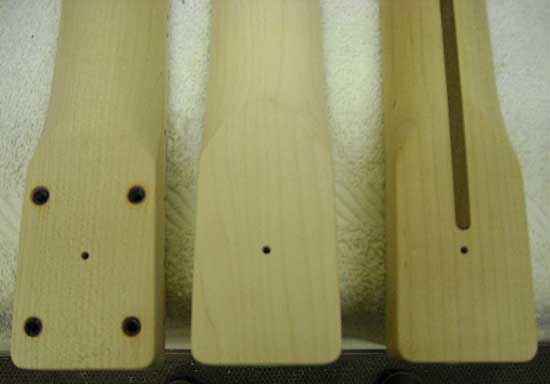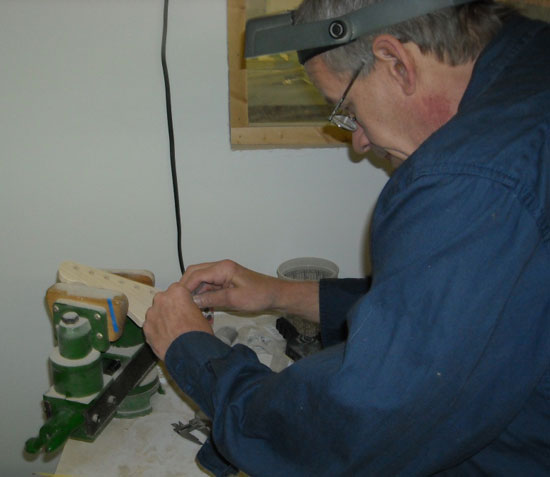Having spent hours bent over jigs, routers and drill presses, I pray I never have to go back to doing body construction in-house. There’s nothing wrong with using templates and hand routing, but it is hard to maintain tight tolerances.
Over the years, I have owned and worked on a ton of vintage guitars, noticing sloppy neck pockets, oddly placed string ferrules and irregular body perimeter shapes. The instruments may be charming, but today’s customer has a much higher standard for accurate tolerances and would never accept inconsistencies in quality.
I am proud to say that Tommy Rosamond and the crew at USA Custom Guitars in Seattle make the majority of my bodies and necks. I have known Tommy for more than 20 years, and we think I was his third customer after he started the business.
Combining his years of experience, huge wood stock and precision CNC routers, he makes the finest necks and bodies out there. There is a reason a lot of builders use USA Custom Guitars, even if they don’t freely admit it.
I’m very picky about selecting the right grain pattern and wood weight, and Tommy and I work closely so that he pulls the prime piece of wood that I want for you.
Bodies are built exactly to requested specs. Neck specs come precisely in the desired size, shape and nut width – all with extremely tight tolerances. This means that you get a guitar with standardized routes that can be easily duplicated for additional builds or repairs. If you change a part, you don’t have to worry about aftermarket parts. They will line up every time.
And it means I devote my time to your guitar’s details like hand shaping the back of the neck, rolling the fingerboards, doing the custom finish work, the fretwork and all the fine points. My primary concern is building you the guitar that you asked for that looks, feels, plays and sounds the way you want.


Having several Crook guitars as well as a number of “vintage” guitars in my collection, I agree with Bill Crook’s statements regarding the better “fit” of my Crook guitars compared to most older guitars in my collection. I find myself grabbing 2 or 3 Crook guitars when I pack up for gigs while passing over the original 60’s Fender guitars that I used to rely on. The quality of Bill Crooks guitars speaks for itself!
Bill, enjoyed your post. Keep up the excellent work.
I am not surprised that outsourcing parts, bodies , necks, pickups etc occur with guitar making. This happens more often than the public knows. As long as the buyers are informed about this as part of the build process I have no problems with that . Bill Nash of Nash Guitars freely admits he assembles his guitars from kits. If people are fine buying them and he is not ripping people off then it is no big deal . The auto industry , airline industry , bicycle , computer motorcycle industry all outsource manufacturing . But people freak out when you do it with guitars. Hey if some one can supply me with bodies and necks at a higher tolerance than I can produce why kill my self building something sub par. It is a great way to build guitars with out all the time leaning how to build guitars . The start up cost is much less. You need much less space to run your production from. I am more upset when manufactures do not admit to outsourcing .Note both Fender and Gibson does this all the time . I had gone to a store to look at some acoustic guitars. One of the guitars that was fro sale was a guitar made from one of the guitar techs on staff. It was apparent it was from a kit and the finish was done with a brush . I was instituted at the price being asked for such a sub par instrument . Needless to say the tech was not pleased when I confronted him about it and he was not admitting that is how that guitar was made. Needless to say this store lost their creditability in my book .
Bill, you already know how I feel on the subject…I’ve been debating for couple of days whether to post anything on this subject or not.
This used to bother me, but the more I thought about it, you have to start with your bill of raw materials somewhere. I doubt any of the boutique effects pedal makers build their own metal enclosures by hand, not to mention all the electronics that go in them. I haven’t seen any boutique amp builders that make speakers or their own tubes and electronics. I don’t see anyone whining about that. Fender may CNC rout their own bodies, but I’m pretty sure the guy who programmed the router isn’t the guy assembling your guitar. For all intents and purposes, Fender effectively supplies parts to themselves at that point…and that’s ignoring the fact that they outsource the manufacture of a lot of their hardware. So anyway, Fender routs their own bodies…that’s cool. Where did they get the wood? Do they own the forests? Did they cut the trees down and mill them themselves, and dry the wood and all that jazz? Again, where do you draw the line?
It’s tough enough waiting almost a year for an awesome instrument. It would be a lot harder to wait even longer for an instrument that costs more and doesn’t have the quality fit & finish of the product you sell today. Bill, I respect the fact that you know your market niche and the skills that you excel at, and the aspects of the craft where other firms do things better than you do, and you leverage that knowledge to offer the best product possible.
This is an interesting discussion. My focus has always been on the quality of the raw materials used – to think about how they will be shaped into the final guitar adds a layer of complexity. Thanks for giving me something to think about.